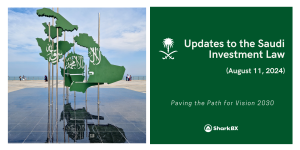Saudi Arabia’s New Investment Law: Key Changes and Implications for Investors (August 11, 2024)

On August 11, 2024, Saudi Arabia introduced some updates to its investment framework through the new Investment Law (Royal Decree No. M/19), which will take effect in February 2025. This new law will replace the current Foreign Investment Law and is a strategic move aligned with Vision 2030, aiming to enhance the Kingdom’s investment landscape. Business owners and investors should take note of these updates, as they are expected to impact both domestic and foreign investment opportunities.
Objectives of the New Investment Law:
The primary goal of this law is to create an attractive and competitive investment environment by:
- Simplifying the establishment of investments, asset ownership, and liquidation processes.
- Reinforcing investor rights and offering transparent and efficient procedures.
- Ensuring equal treatment of local and foreign investors.
- Promoting competitive neutrality, providing equal opportunities for all investors.
- Supporting the Kingdom’s broader economic development and job creation objectives.
Key Enhancements Over the Current Law:
- Title and Scope
- New: Governs provisions for both local and foreign investors.
- Current: Focused solely on foreign investors.
- Investment Requirements
- New: Abolishes the need for an investment license, allowing free practice of economic activities, except for those on a to-be-determined list.
- Current: Foreign investors must obtain an investment license.
- Investor Treatment
- New: Equal treatment between domestic and foreign investors.
- Current: No specific provisions for equality.
- Investment Incentives
- New: Establishes better governance for granting investment incentives and facilities.
- Current: Lacks a structured system for investment incentives.
- Investor Rights
- New: Ensures investor protection through clear mechanisms for complaints and dispute resolution. It aligns local and foreign investor rights with international standards, emphasizes intellectual property protection, and facilitates capital transfers.
- Current: Limited protection and investor rights.
- Violations
- New: Classifies violations as serious or non-serious and establishes penalty standards.
- Current: No specific categorization of violations.
- Dispute Resolution
- New: Investors can seek recourse through competent courts or alternative dispute resolution mechanisms like arbitration or mediation.
- Current: Amicable settlement of disputes with the government.
What’s Changing for Investors?
The reformed investment law coincides with Saudi Arabia’s broader economic diversification efforts under Vision 2030. The updated framework aims to attract more foreign direct investment (FDI), which grew by 12% in 2023. These updates are also timely as the Kingdom pursues large-scale projects, including privatization initiatives and giga-projects that require extensive investment.
The law was developed following consultations with international experts, benchmarking best practices from countries like Singapore, Germany, and the UAE. Key changes include streamlined procedures, fewer regulatory burdens, and improved protections for investors.
General Investment Rules:
Under the new regime, investment in Saudi Arabian companies will be open to both local and foreign investors. The Negative List will define the restricted sectors, and investors operating outside of these sectors can expect fewer hurdles, such as the removal of the foreign investment license requirement. However, new registration procedures will be introduced for foreign investors, overseen by the Ministry of Investment of Saudi Arabia (MISA).
Foreign investors in excluded sectors will still require approvals, and more clarity on these provisions will emerge once the implementing regulations are finalized.
Key Features of the New Regime:
- Administrative Ease: Less burden on foreign investors, with a move towards simple registration over complex licensing processes.
- Robust Protections: Stronger legal rights for investors, including transparent complaint mechanisms and capital transfer provisions.
- Incentives: A clear framework for granting investment incentives, which are expected to stimulate further FDI.
- Compliance: Investors must adhere to Saudi Arabian laws and international agreements, while MISA retains discretion over suspensions related to national security.
Looking Ahead:
As Saudi Arabia continues to align its investment environment with international standards, foreign investors are encouraged to explore opportunities. Whether establishing a new company, investing in a local entity, or setting up a branch, investors should remain informed on sector-specific restrictions and prepare for the new registration processes. Compliance with corporate governance and competition laws will remain key.
For more information and updates, and to seek expert support with navigating these changes, contact SharkBX. We offer comprehensive services for company setup and investor integration in Saudi Arabia.
